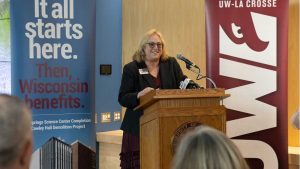2018 Midterm Elections: Record-breaking firsts in voter-turnout and diversity

retrieved from WPR.com
November 11, 2018
This past Tuesday, Nov. 6, a record numbers of citizens across the nation participated in the midterm elections. The amount of voters was not the only unprecedented aspect of the election, as many of the candidates elected into office broke barriers in diversity – including the first Muslim and first lesbian Native American women in Congress as well as the nation’s first openly gay governor.
According to the Wisconsin Election Commission, 2.67 million Wisconsin voters participated in the Gubernatorial Midterm Election which is the highest number of midterm voters the state has ever seen.
La Crosse county saw an 85% voter turnout rate, with 57,562 ballots cast out of 67,404 total registered voters. The City of La Crosse Ward 8, which encompasses UWL’s campus, also had an 85% voter turnout rate, having 1774 of the registered 2079 cast a ballot.
This election brought changes to Wisconsin’s government – primarily a new governor. Democrat Tony Evers beat Republican Incumbent Scott Walker by just over 30,000 votes which was just over 1 percent of the votes cast. Another close call was the vote for Wisconsin’s Attorney General, which saw Josh Kaul beating Incumbent Brad Schimel by just under 18,000 votes.
In both of these races, La Crosse county voters were largely in favor of Evers and Kaul, with both winning by a 15-percentage point in the county.
The race for Wisconsin’s U.S. Senate seat was one area of midterms where there was little need for a close eye. Democrat Incumbent Tammy Baldwin took victory over Republican challenger Leah Vukmir by close to 300,000 votes.
In elections across the nation, there were many firsts. In Colorado, Jared Polis became the first openly gay male elected governor. Ilhan Omar, a Democrat out of Minnesota, and Rashida Omar, a Democrat from Michigan, became the first Muslim women elected into Congress.
Both Democrats, Debra Haaland and Sharice Davids – from New Mexico and Kansas respectively – are the first Native American women elected into Congress. Davids is also the first lesbian Native American to be elected into the House.
Once those elected are sworn in to office next year, there will be a new record number of women in the House. The 34 elected women will join 66 incumbents, making a total of 100 out of 435 House seats held by women. The previous record of female-held seats in the House is 84 according to the Center for American Women and Politics.
There were also several states which witnessed their own firsts. Some of these include the first Black Congresswoman from Massachusetts, the first Latina Congresswoman from Texas, and the first openly gay Congressman from New Hampshire.





